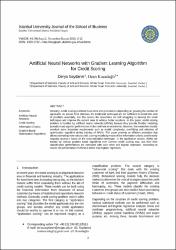Mimar Sinan Güzel Sanatlar Üniversitesi Açık Bilim, Sanat Arşivi
Açık Bilim, Sanat Arşivi, Mimar Sinan Güzel Sanatlar Üniversitesi tarafından doğrudan ve dolaylı olarak yayınlanan; kitap, makale, tez, bildiri, rapor gibi tüm akademik kaynakları uluslararası standartlarda dijital ortamda depolar, Üniversitenin akademik performansını izlemeye aracılık eder, kaynakları uzun süreli saklar ve yayınların etkisini artırmak için telif haklarına uygun olarak Açık Erişime sunar.MSGSÜ'de Ara
Artificial Neural Networks with Gradient Learning Algorithm for Credit Scoring
| dc.contributor.author | Soydaner, Derya | |
| dc.contributor.author | Kocadağlı, Ozan | |
| dc.date.accessioned | 2022-06-08T18:31:17Z | |
| dc.date.available | 2022-06-08T18:31:17Z | |
| dc.date.issued | 2015 | |
| dc.identifier.issn | 1303-1732 | |
| dc.identifier.uri | https://hdl.handle.net/20.500.14124/62 | |
| dc.description.abstract | Recently, credit scoring problems have come into prominence depending on growing the number of applicants. As known from literature, the traditional techniques are not sufficient to model this kind of problems accurately. For this reason, the researchers are still struggling to develop the novel techniques and improve the current ones to achieve better solutions. In this paper, credit scoring problem is handled by artificial neural networks (ANNs) because they provide flexible modeling procedure and superior performances in the nonlinear environments. However, the researchers mostly overlook some important requirements such as model complexity, overfitting and selection of optimization algorithm during training of ANNs. This paper presents an efficient procedure that allows estimating more robust credit scoring models by means of the information criteria and the early stopping approach based on the cross-validation technique. In the application section, ANNs are trained by various gradient based algorithms over German credit scoring data, and then their classification performances are compared with each other and logistic regression. According to results, the performance of ANNs is better than logistic regression. | en_US |
| dc.language.iso | eng | en_US |
| dc.publisher | Istanbul University | |
| dc.relation.ispartof | Istanbul University Journal of the School of Business | en_US |
| dc.rights | info:eu-repo/semantics/openAccess | en_US |
| dc.title | Artificial Neural Networks with Gradient Learning Algorithm for Credit Scoring | en_US |
| dc.type | article | en_US |
| dc.authorid | 0000-0003-4354-7383 | |
| dc.authorid | 0000-0002-3212-6711 | |
| dc.institutionauthor | Soydaner, Derya | |
| dc.institutionauthor | Kocadağlı, Ozan | |
| dc.identifier.volume | 44 | en_US |
| dc.identifier.issue | 2 | en_US |
| dc.identifier.startpage | 3 | en_US |
| dc.identifier.endpage | 12 | en_US |
| dc.relation.publicationcategory | Makale - Ulusal Hakemli Dergi - Kurum Öğretim Elemanı | en_US |
| dc.authorwosid | AAO-9309-2021 | |
| dc.authorwosid | AAO-2482-2021 | |
| dc.identifier.wosquality | N/A | |
| dc.identifier.wos | WOS:000409808300002 | |
| dc.identifier.trdizinid | 193022 | |
| dc.indekslendigikaynak | Web of Science | |
| dc.indekslendigikaynak | TR-Dizin |
Bu öğenin dosyaları:
Bu öğe aşağıdaki koleksiyon(lar)da görünmektedir.
-
TRDizin [1118]
TR Index -
Ꮃeb of Science [1834]
Web of Science platform















